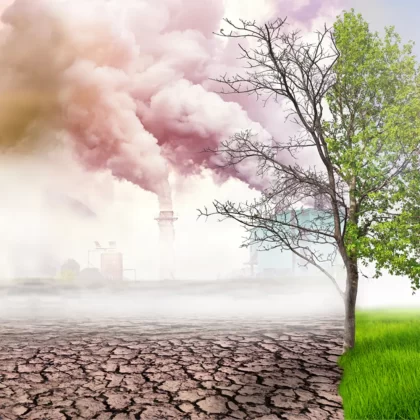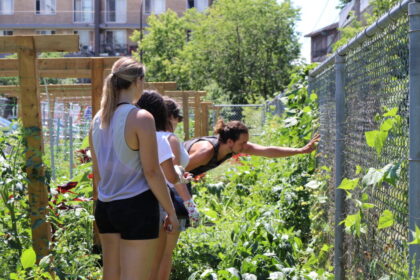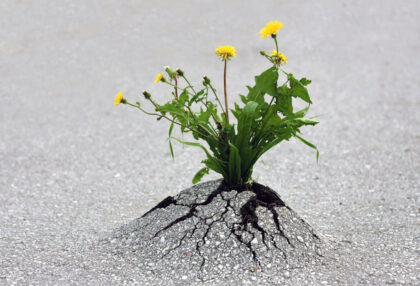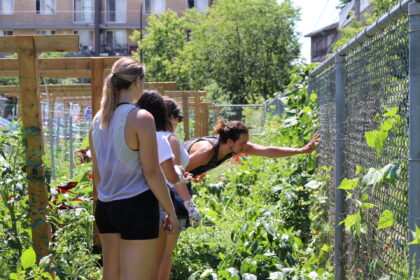
Description
Welcome to Ecological Economics
Course Information
Day/Time: Thursday 5:45 – 8:15 PM
Office Hours: Monday 4:00 – 5:30 PM (by request)
Classroom: H 557 SGW
Weekly Lessons
Important Dates
Last day to register: | Monday, September 19, 2022 |
Last day to withdraw (refund): | Monday, September 19, 2022 |
Last day to discontinue (no refund): | Thursday, December 8, 2022 |
Last day of in-class testing: | Wednesday, November 30, 2022 |
Final exams: | December 9-22, 2022 |
Travel arrangements should not be made prior to the posting of the final Exam Schedule. | |
Course Overview
This course provides an introduction to economic perspectives on environmental issues. It is designed to study the interplay between the economic sphere and the environment by addressing questions of economic life, such as activities of corporations and states, role of markets, energy and resource use, growth and development, population, food, international trade and financial systems. These questions are explored through alternative economic approaches, among which the tradition of ecological economics is the centrepiece.
Learning Outcomes
Through this course, students should be able to:
- Understand how economics can be used to identify the causes and consequences of environmental problems and offer solutions to address these problems.
- Develop a critical understanding of a plurality of economic approaches in relation to environmental problems.
- Communicate the history and philosophies within the field of ecological economics.
- Use the tools and language of ecological economics to explain contemporary environmental issues and concrete real-world cases.
- Apply diverse economic approaches to imagine and create ethical economic conditions.
- Move beyond understandings of weak sustainability towards more transformative approaches.
- Incorporate social justice and decolonial perspectives in understanding ecological economics.
- Perform action research to incorporate ontological approaches in creating new economic possibilities.
- Understand how to re-embed economies into society and the biosphere.
- Identify planetary boundaries and ecological crises.
- Comprehend degrowth economic perspectives.
- Identify multiple forms of value and understand how to compare conflicting theories of value.
Instructional Method
This course will be given in-person. I will use a variety of pedagogical styles including lectures, discussions, guest speakers (possibly), field trips (maybe), community service learning and/or experiential learning. Students are expected to read the required text before coming to class. Students will engage with each other through interactive activities and discussions in breakout groups.
Required Course Material
There is no specific textbook for the course. All of the readings are made available at the Concordia library in e-version and (on a few occasions) in the course reserve if no e-version is available.
Course Description
Global capitalism promotes practices that are socially and environmentally harmful. To increase profits, companies externalize social and planetary costs. Classical and neo-classical economists have perpetuated the idea that value is achieved through resource extraction and that human activity is separate from nature – the metabolic rift. Furthermore, traditional economists continue to claim that economic success occurs when production increases. However, increasing production in a world with planetary limitations is destructive to living organisms.
In this course, students will read and discuss a variety of economic perspectives to understand the causes and consequences of current ecological crises. Students will learn about various political and economic philosophies to better understand how to solve these issues. For example, students will learn about other ways to get goods and services over and above market transactions, like, reciprocity, and redistribution. They will also learn about political, economic, and social spheres to understand the complex intersections of human activity, economies and political power. Students will take macro and micro approaches to understand global and local economies. They will also critically evaluate the political/economic role of firms and institutions as well as economic practices, like work, leisure, consumption, energy use, sustainable development, resource use, trade, and waste management. Finally, students will critically reflect on their involvement in these economic practices and learn about ways to solve (or improve) current ecological problems collectively.
In the first part of the course, students will learn about the field of ecological economics. They will learn how to compare/contrast traditional economics with current ecological economic perspectives. Students will learn about the history of economics, the development of ecological economics, and contemporary ecological economic thought. They will address questions like, what is ecological economics? How does it differ from traditional economic approaches? What are current trends in ecological economics? In the second part of the course, students will learn about ecological boundaries, crises and measurement indicators. They will address questions like, what global problems are we currently facing? What are the planetary boundaries? How can we measure these boundaries and know whether we are close to a tipping point? In the third part of the course, students will learn about ways to build and strengthen ethical economic practices. Students will ask questions like; how can we re-embed economic systems into social and biological spheres? How can we create ethical economic practices? How can we prioritize values that are positive and not destructive? How can we stop focusing on increasing production to measure economic success?
Throughout the course, students will critically reflect on the way they participate in local and global economies. They will also perform an action-research project to make ethical interventions to create better economic practices that include social justice, strong sustainability and decolonial perspectives.
Course Schedule
September 8 – Introduction to Course
September 15 – Introduction to Ecological Economics
Required Readings:
Please read two of the following three choices.
Introduction – The Unfinished Journey of Ecological Economics (1 – 13)
Choice 3 – Røpke, I. (2020) Econ 101—In Need of a Sustainability Transition, 169.
Recommended Readings:
Introduction: Finding Pleuriversal Paths (xxii – xl)
September 22 – Situating Ecological Economics
Required Readings:
Please read one of the following two choices.
Choice 1 – For students who have little or no knowledge of economic philosophy or history:
The Preliminaries: (15 – 62)
Chapter 1 – The Economy and Economics (15 – 30)
Chapter 2 – Capitalism (31 – 40)
Chapter 3 – Economic History (41 – 51)
Chapter 4 – The Politics of Economics (52 – 62)
Choice 2 – For students who have more advanced knowledge of economic philosophy and history:
Chapter 4 – Societies and Economic Systems (45 – 58)
Chapter 5 – Evolution of the Market Pattern (59 – 70)
Chapter 6 – The Self-Regulating Market and the Fictitious Commodities: Land, Labour and Money (71 – 80)
September 29 – Current and Future Concerns of Ecological Economics
Required Readings:
Chapter 19 – Looking Forward: Current Concerns and the Future of Ecological Economics.
October 6 –Defining Ecological Economics
Required Readings:
Students will be assigned groups in class 3. Each group will read one of the following chapters.
Chapter 1 – Taking Stock: The Keystones of Ecological Economics (1 – 25)
Chapter 2 – The Content, Direction and Philosophy of Ecological Economics (26 – 47)
Chapter 3 – Analytical Philosophy and Ecological Economics (48 – 73)
Chapter 4 – Value Deliberation in Ecological Economics (74 – 99)
October 13 – Planetary Boundaries and Indicators
Required Readings:
Part 1 – A No-Analog State
Chapter 1 – A Second Copernican Revolution (27 – 37)
Chapter 2 – The Great Acceleration (38 – 47)
Chapter 3 – When did the Anthropocene Begin? (48 – 58)
Recommended Readings:
Steffen,W., Richardson, K., Rockström, J., Cornell, S. E., Fetzer, I., Bennett, E. M., Biggs, R., Carpenter, S. R., de Vries, W., de Wit, C. A., Folke, C., Gerten, D., Heinke, J., Mace, G. M., Persson, L. M., Ramanathan, V., Reyers, B., Sörlin, S. (2015) Planetary Boundaries: Guiding Human Development on a Changing Planet, 347, 6223.
October 20 – Planetary Boundaries and Indicators (Part 2)
Required Readings:
Chapter 4 – Tipping Points, Climate Chaos and Planetary Boundaries (59 – 77)
Chapter 5 – First Near-Catastrophe (78 – 88)
Chapter 6 – A New (and Deadly) Climate Regime (89 – 106)
Recommended Readings:
Chapter 4 – Measurement of Essential Indicators in Ecological Economics (125 – 147)
Chapter 5 – Boundaries and Indicators: Capturing and Measuring Progress Towards an Economy of Right Relationship Constrained by Global Ecological Limits (148 – 189)
October 27 – Re-Embedding Economies
Required Readings:
Chapter 1 – The Ethics of Re-Embedding Economics in the Real: Case Studies (21 – 65)
Recommended Readings:
November 3 – Bio-Physical Foundations of Social-Economic Systems
Required Readings:
November 10 – Value and Ecological Economics
Required Readings:
Pirgmaier, E. (2021) The Value of Value Theory for Ecological Economics, Ecological Economics, 179.
Recommended Readings:
Roland, E., Landua, G. (2013) Regenerative Enterprise: Optimizing for Multi-Capital Abundance.
November 17 – Creating Ethical Economies
Required Readings:
Recommended Readings:
November 24 – Degrowth
Required Readings:
Recommended Readings:
December 1 – Course wrap up
Course Assignments
Participation: The participation grade is based on attendance, involvement in in discussions, participation in classroom activities and supplemental tasks.
Blog Posts: Students will write two blogs of about 600 – 1000 words about ecological economics. The first blog post will focus on defining, situating, and/or identifying historical or contemporary trends in ecological economics. The second blog will focus on ecological crises, planetary boundaries, indicators and/or solutions to these problems. Although this is a blog, the information conveyed must come from research, not conjecture. In addition, the blog must contain at least eight reliable, valid, credible sources and reference the course readings. Students with production skills can produce a video or a podcast instead of a blog; however, this must also be approved by me (Erik Chevrier).
Community Service-Learning Project: The objective of this assignment is to give students hands on experience learning about ecological economics by participating with community members trying to create ethical economies and/or fight for social justice. Students will perform an action-based research project by creating a project and/or participating with an already existing initiative at Concordia University or in the community at large. Students will participate in a group project and submit the report as a group. Students will be evaluated based on the depth of their involvement with the project, clearly reporting the project, and an oral presentation of the project.
Students must form a group; however, they may choose to work on something in a group that already exists and/or create something with like-minded people outside the classroom. Students will form clusters and contribute to the project based on their area of expertise. For example, someone with great research skills could get involved with the research portion of the project, someone with media skills can build media infrastructure, someone with great interpersonal communication skills can be the mobilizer, among other tasks. Students will be evaluated based on the depth of their involvement with the project, their deliverables, clearly reporting their contribution to the project, an oral presentation summarizing their role in the project, and linking the project to the course material.
Action Research Project Proposal: Students will write a proposal for the action research project they want to partake in. Students may participate in a group project and submit the proposal as a group. Students must (1) identify a group to participate with or a project to create, (2) outline a specific timeline for the project, (3) summarize their role in the project, (4) describe how they intend to write their final report, (5) link the topic to class readings and other ecological economic issues.
Due Dates and Grade Weight
Name of Assignment | Due Date | % of final grade |
Blog 1 – Defining, Situating, Identifying Trends | October 20th | 30% |
Blog 2 – Ecological Crises and Solutions | December 1st | 30% |
Action-Research Proposal | October 24th | 10% |
Action-Research Project | December 7 | 25% |
Participation | Ongoing | 5% |
More information on university regulations concerning evaluation can be found here. The grading system is described in section 16.1.11 of the Undergraduate Calendar.
Please note that for 200-level courses, instructors in the Department of Geography, Planning and Environment reserve the right to adjust the final reported grades so that under normal circumstances no more than 25% of students registered in a course receive an outstanding grade (A-, A, A+).
Letter to Grade Equivalent
A+ | 95 – 100 | B+ | 80 – 84.9 | C+ | 67 – 69.9 | D+ | 57 – 59.9 | F | 0 – 49 |
A | 90 – 94.9 | B | 75 – 79.9 | C | 63 – 66.9 | D | 53 – 56.9 | NR | No report |
A- | 85 – 89.9 | B- | 70 – 74.9 | C- | 60 – 62.9 | D- | 50 – 52.9 |
|
|
Extraordinary Circumstances
In the event of extraordinary circumstances and pursuant to the Academic Regulations, the University may modify the delivery, content, structure, forum, location and/or evaluation scheme. In the event of such extraordinary circumstances, students will be informed of the changes.
University Regulations
Students should be aware of the following university regulations (see Undergraduate Calendar for complete details).
- Late Completion of courses with “INC” notations – Procedures and Regulations (Undergraduate Calendar 3.5)
- Academic Re-evaluation (Undergraduate Calendar 16.3.9)
- Degree Requirements for BA, BSc, BEd – 24 credit rule and general education requirements for students in degree programs offered by Faculty of Arts & Science (Undergraduate Calendar 31.003)
Late Assignment and Submission Policy:
Unless you are given permission in advance, late assignments will not be accepted without adequate documentation of medical or personal emergencies. All assignments must be submitted in hard copy on the due date. Assignments that are received electronically will have 30% deducted from the grade of the assignment.
Class Cancelations
Classes are officially considered cancelled if an instructor is 15 minutes late for a 50-minute class, 20 minutes late for a 75-minute class, or 30 minutes late for longer classes.
Intellectual Property
Content belonging to instructors shared in online courses, including, but not limited to, online lectures, course notes, and video recordings of classes remain the intellectual property of the faculty member. It may not be distributed, published or broadcast, in whole or in part, without the express permission of the faculty member. Students are also forbidden to use their own means of recording any elements of an online class or lecture without express permission of the instructor. Any unauthorized sharing of course content may constitute a breach of the Academic Code of Conduct and/or the Code of Rights and Responsibilities. As specified in the Policy on Intellectual Property, the University does not claim any ownership of or interest in any student IP. All university members retain copyright over their work.
Class Conduct
All individuals participating in courses are expected to be professional and constructive throughout the course, including in their communications.
Concordia students are subject to the Code of Rights and Responsibilities which applies both when students are physically and virtually engaged in any University activity, including classes, seminars, meetings, etc. Students engaged in University activities must respect this Code when engaging with any members of the Concordia community, including faculty, staff, and students, whether such interactions are verbal or in writing, face to face or online/virtual. Failing to comply with the Code may result in charges and sanctions, as outlined in the Code.
In order to create a climate for open and honest dialogue and to encourage the broadest range of viewpoints, it is important for class participants to treat each other with respect. Name-calling, accusations, verbal attacks, sarcasm, and other negative exchanges are counter-productive to successful teaching and learning. The purpose of class discussions is to generate greater understanding about different topics. The expression of the broadest range of ideas, including dissenting views, helps to accomplish this goal. However, in expressing viewpoints, students should try to raise questions and comments in ways that will promote learning, rather than defensiveness and feelings of conflict in other students. Thus, questions and comments should be asked or stated in such a way that will promote greater insight into the awareness of topics as opposed to anger and conflict. The purpose of dialogue and discussion is not to reach a consensus, nor to convince each other of different viewpoints. Rather, the purpose of dialogue in the classroom is to reach higher levels of learning by examining different viewpoints and opinions with respect and civility.
Academic Integrity
Academic integrity means that every student must be honest and accurate in their work. The Academic Code of Conduct includes rules and regulations students must follow. Unacceptable practices include the following
- Copy from ANYWHERE without saying from where it came.
- Omit quotation marks for direct quotations.
- Let another student copy your work and then submit it as his/her own.
- Hand in the same assignment in more than one class without permission.
- Have unauthorized material in an exam, such as cheat sheets, or crib notes. YOU DON’T HAVE TO BE CAUGHT USING THEM – JUST HAVING THEM WILL GET YOU INTO TROUBLE!
- Copy from someone else’s exam.
- Communicate with another student during an exam by talking or using some form of signals.
- Add or remove pages from an examination booklet or take the booklet out of an exam room.
- Get hold of or steal an exam or assignment answers or questions.
- Write a test or exam for someone else or have someone write it for you.
- Hand in false documents such as medical notes, transcript or record.
- Falsify data or research results.
The most common offense under the Academic Code of Conduct (see link below) is plagiarism, which the Code defines as “the presentation of the work of another person as one’s own or without proper acknowledgement.”
This could be material copied word for word from books, journals, internet sites, professor’s course notes, etc. It could be material that is paraphrased but closely resembles the original source. It could be the work of a fellow student, such as an answer on a quiz, data for a lab report, or a paper or assignment completed by another student. It could be a paper purchased through one of the many available sources. Plagiarism does not refer to words alone. It can also refer to copying images, graphs, tables, and ideas. Plagiarism is not limited to written work. It also applies to oral presentations, computer assignments and artistic works. Finally, if you translate the work of another person into French or English and do not cite the source, this is also plagiarism. In simple words: DO NOT COPY, PARAPHRASE OR TRANSLATE ANYTHING FROM ANYWHERE WITHOUT SAYING FROM WHERE YOU OBTAINED IT!
Take care to inform yourself of the rules, regulations and expectations for academic integrity.
List of Student Services |
|
Academic Code of Conduct | http://www.concordia.ca/academics/undergraduate/calendar/current/17-10.html |
Academic Integrity | |
Access Centre for Students with Disabilities (ACSD) | |
Advocacy and Support Services | http://www.concordia.ca/offices/advocacy
|
Campus Services | |
Conduct on Campus | |
Counselling and Psychological Services | http://www.concordia.ca/offices/counselling-psychological-services |
Dean of Students’ Office
| http://www.concordia.ca/offices/dean-students
|
Financial Aid & Awards Office | |
HOJO (Off Campus Housing and Job Bank) | |
International Students’ Office | |
Library Services
|
|
Library Citation and Style Guides | |
Ombuds Office | |
Otsenhákta Student Centre | |
Safety and Security
| http://www.concordia.ca/students/campus-services/safety-emergency
|
Sexual Assault Resource Centre
| http://www.concordia.ca/students/sexual-assault
|
Student Academic Services | |
Student Health Services
| http://www.concordia.ca/students/health
|
Student Hub | |
Student Success Center |
Territorial Acknowledgement:
I acknowledge that Concordia University is located on unceded Indigenous lands. The Kanien’kehá:ka Nation is recognized as the custodians of the lands and waters on which we gather today. Tiohtiá:ke/Montreal is historically known as a gathering place for many First Nations. Today, it is home to a diverse population of Indigenous and other peoples. We respect the continued connections with the past, present and future in our ongoing relationships with Indigenous and other peoples within the Montreal community. (Indigenous Directions Leadership Group, Feb. 16, 2017)




